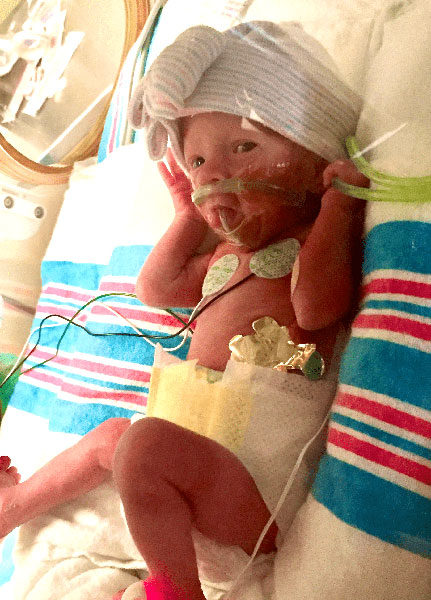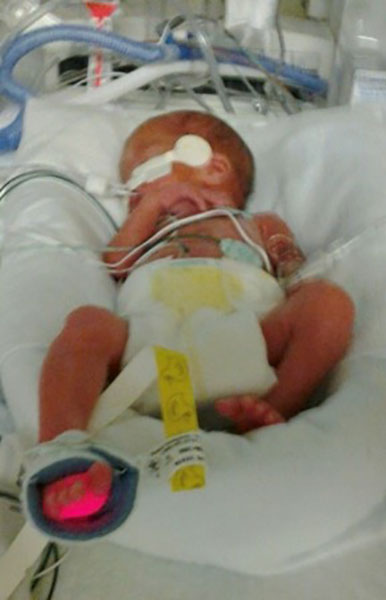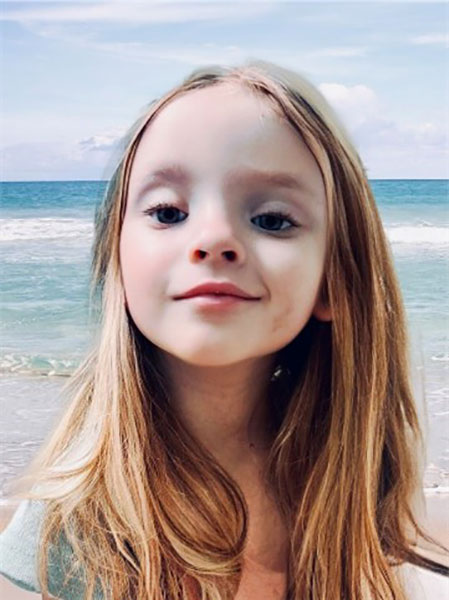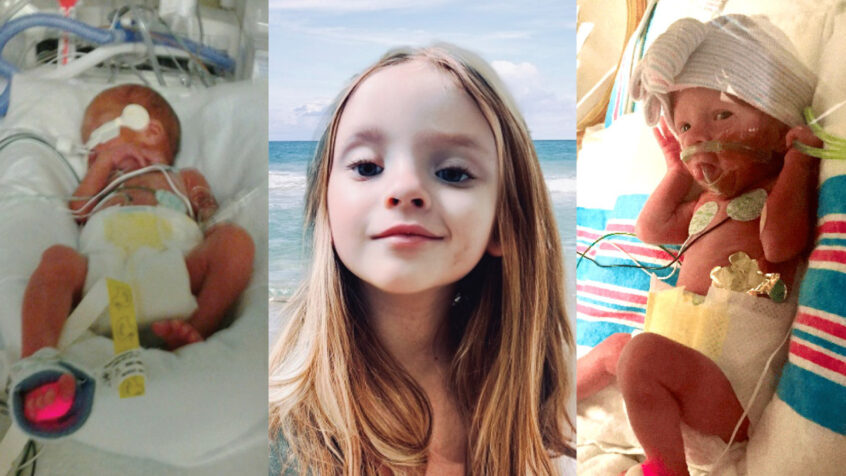by Celia Lisset Alvarez
ICU baby Bereavement Supporter
“I’m in labor,” I said to my husband. He had practically just gone home. It was near midnight.
I was crying as they wheeled me—quickly—to the operating room. I had spent the last three weeks on bed rest, trying not to give birth. I was only 27 weeks along.
“It’s twins!” the technician had announced with glee. My husband and I looked at each other, speechless. After two miscarriages, we had finally had our first baby, a beautiful girl we named Lucy, less than a year ago.
 The two miscarriages had been boys, both of whom we were planning on calling Arturo, after my grand-uncle Arturito (the Spanish diminutive he carried to his death at 97). Arturito was more like a grandfather to me. I never met either of my grandfathers, both dying in Cuba before I was born. But Arturito; he was my best friend. Though he lived up north, for over forty years he came every summer to visit us in Miami. He would spend a month with us, making cocktails, cracking jokes, playing dominoes and push rummy. And every night, when we went to sleep, I would kiss him, and say, “Good night, Arturito, I love you.” “I love you too, Marmita,” he’d respond. That was his pet name for me—“little marmot”—because I used to take so much time getting ready to go out when I was a teenager.
The two miscarriages had been boys, both of whom we were planning on calling Arturo, after my grand-uncle Arturito (the Spanish diminutive he carried to his death at 97). Arturito was more like a grandfather to me. I never met either of my grandfathers, both dying in Cuba before I was born. But Arturito; he was my best friend. Though he lived up north, for over forty years he came every summer to visit us in Miami. He would spend a month with us, making cocktails, cracking jokes, playing dominoes and push rummy. And every night, when we went to sleep, I would kiss him, and say, “Good night, Arturito, I love you.” “I love you too, Marmita,” he’d respond. That was his pet name for me—“little marmot”—because I used to take so much time getting ready to go out when I was a teenager.
When I first got pregnant in 2015, I started calling the baby Arturito. “Arturito made me buy these shoes,” I said once to my husband when I came home with a pair of comfortable flats.
 I miscarried at five weeks.
I miscarried at five weeks.
When I got pregnant again, my husband and I agreed that if it was a boy, we’d name him Arturo. I miscarried at eleven weeks. I got pregnant again. This time it was a girl: our beautiful, healthy Lucy. We were ecstatic. My husband and I decided to try for one more. Lucy’s pregnancy had been so seamless that we had no qualms about this one. Weeks went by, and everything seemed fine.
Meanwhile, Arturito fell out of bed and hit his head. I rushed to his side; he recognized me. I stayed for four days, until I got a call from work, wondering when I was coming back. I said goodbye, kissed his cheek. “I love you too, Marmita,” he said. He lingered for almost a month. He never got to meet Lucy.
It was gender-reveal time. The technician moved the wand over the first baby—a girl! She moved up to the second baby—a boy! A boy we would name Arturo.
I went into labor at twenty-seven weeks. I gave birth to “micro preemies,” each about two pounds. “Twenty fingers and twenty toes?” I asked my husband when I regained consciousness. “Yes,” he said, and I fell back into a morphine-induced sleep.
Twenty-seven weeks later, I gave birth to “micro preemies,” each about two pounds. “Twenty fingers and twenty toes?” I asked my husband when I regained consciousness. “Yes,” he said, and I fell back into a morphine-induced sleep.
For twenty-five days, Sara and Arturito progressed well. On the twenty-sixth day, we got an early-morning call. “The baby has taken a turn for the worse,” the doctor said. Arturito had developed a runaway infection and wasn’t responding to any antibiotics.
The entire team of NICU doctors came to chime in on his case. They called the crash cart in at about 10 pm. For almost an hour, they tried to resuscitate him. “Not again, please, not again,” my husband whispered in my ear as we clutched each other in the corner of the room, unable to do a thing. Near 11 pm they stopped trying. My Arturito was gone, again. They swaddled him in a blanket and put him in my arms. It was the first time I had been able to hold him free from tubes and tapes. I could see his face. It was the first time he looked like a real baby instead of a fetus, even though he had turned dark purple. I don’t know how long I was in that room, holding my baby and whispering, “I’m sorry, I’m sorry,” into his tiny ear. Finally, I put him in the acrylic crib by the door and left. I didn’t even remember Sara was in the room.
After Arturo’s burial, however, I went straight back to the NICU. They had moved Sara to a single room in a less critical part of the hospital. I didn’t really care. I’d left myself in that other room with my baby, and this was a new me. A new me who was determined that Sara would live. I held her all the time. I fed her; I changed her diapers. I turned the armchair around so I could look at the monitors, her oxygen levels, her pulse. I sang to her.
She lived.
 Sara is now a happy, healthy three-year-old. She bears no mark I of having been born so early. She keeps pace with her older sister, and together they scheme to pick the lock to my room to rifle through my makeup.
Sara is now a happy, healthy three-year-old. She bears no mark I of having been born so early. She keeps pace with her older sister, and together they scheme to pick the lock to my room to rifle through my makeup.
We take both girls to the cemetery to visit Arturito’s grave. I’m not sure how much they understand. I want his memory to be a constant in their growing minds, not some surprise information they receive when they are older. This way, Arturito lives on, in our lives, our words, and most of all in Sara, who carries his presence like a shadow wherever she goes. I see him running through the tall grass in the back yard. I see him, peddling his tricycle. I see him in the empty chair at dinner. I see him.
Celia Lisset Alvarez is a writer and editor living in Miami, Florida. She wrote about the loss of her son in Multiverses, a speculative memoir in verse available from Finishing Line Press.

